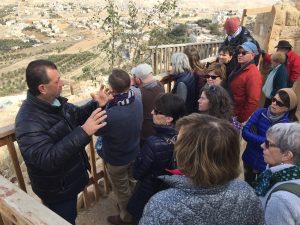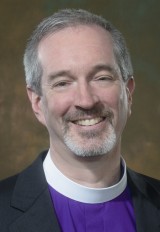
Iyad Qumri, presenting pilgrims with an overview of Jerusalem
Dear Friends,
Many of you know that I recently returned from a pilgrimage to the Holy Land. Traveling through Israel and Palestine, we saw places both ancient and modern, visiting sites associated with the stories of the Bible, all the while seeing and experiencing how this region is deeply divided.
Our guide for the tour was Iyad Qumri. Iyad describes himself as a Palestinian, an Arab, and a Christian. He is accustomed to people being surprised that he is both Arab and Christian. Our preconceptions and stereotypes are often broken apart when we travel, and that is one of the great benefits of a pilgrimage such as this.
The challenges faced by Christian communities in the Middle East has caused many Christians to leave. Many Palestinian Christians live in the occupied West Bank and East Jerusalem, and opportunities for work and freedom to travel, which we take for granted, are limited. Bethlehem, which in 1947 had a population that was 85% Christian, is now only 15% Christian.
What so impresses me about Iyad, his family, and others we met who are living under such challenging circumstances is their deep faith and resilience. Christians in the Holy Land are sometimes referred to as “the living stones.” Their faith is indeed alive, and a witness to us.
I look around us and see the divisions within our own country. I wonder if we can overcome them. And then I remember Iyad, and the way he faces even greater challenges, faithfully bringing the Gospel alive for pilgrims with patience, confidence, and even laughter. And I am given hope.
Faithfully,
Tom
 Summer Camp opportunities at the Barbara C. Harris Episcopal Camp are now available. Brochures are available at church, and you can also check out the camp opportunities at the camp’s website here.
Summer Camp opportunities at the Barbara C. Harris Episcopal Camp are now available. Brochures are available at church, and you can also check out the camp opportunities at the camp’s website here.


